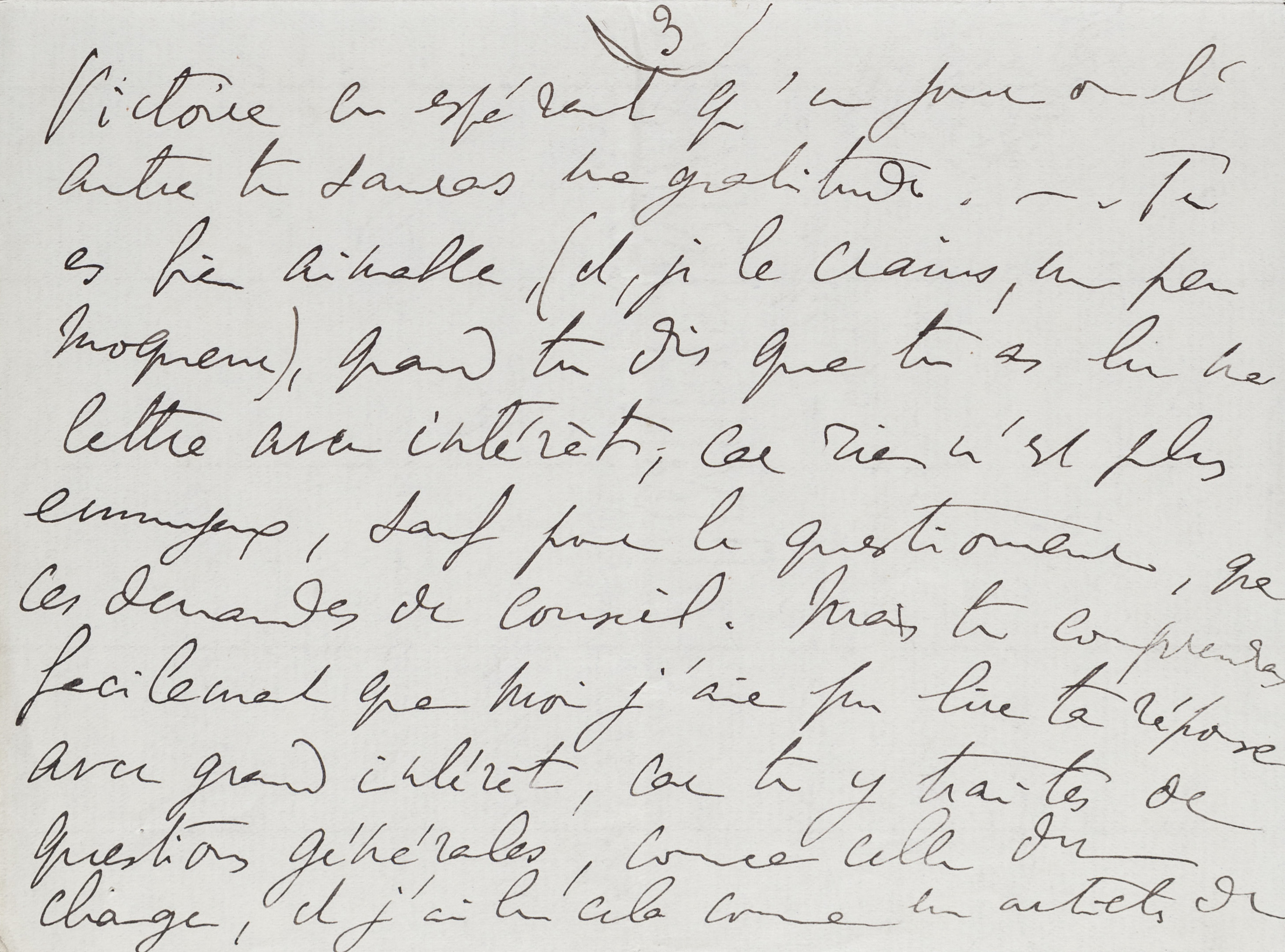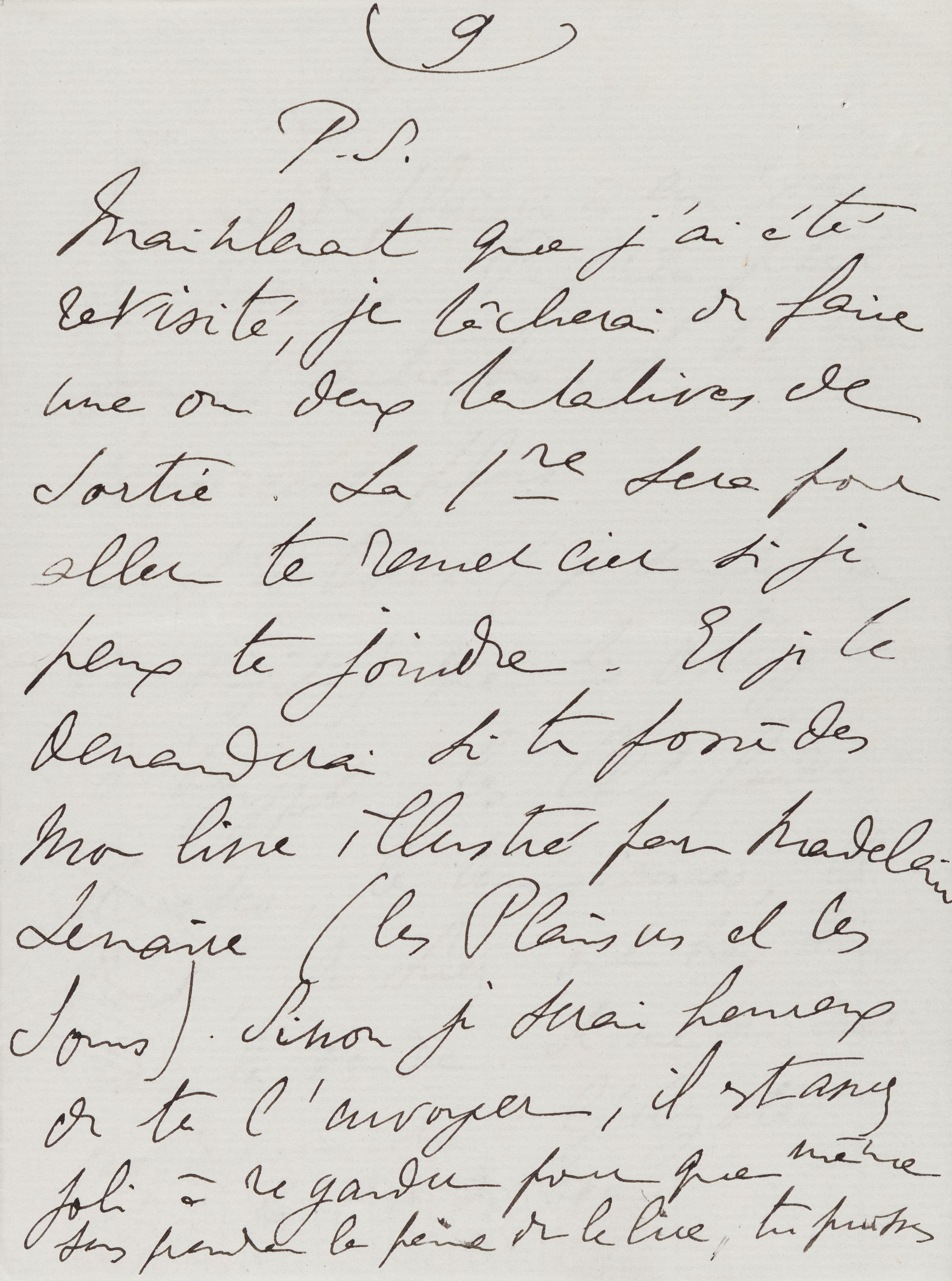By Julien Berthelon, graduate student in French
Letter from Marcel Proust to Lionel Hauser, [27 August 1915] [1]
Friday [2]
My dear Lionel
I did in fact write to express my profound gratitude but the letter had an unlucky fate. It was taken immediately to boulevard Flandrin as it was too late for rue de la Victoire, [3] but the bearer was told you no longer lived there. Then the next day I sent it to rue de la Victoire, but you were not there. Today (it has been 48 hours that you have been unaware that I am not ungrateful, which makes me sick to think about) I had someone go to rue de la Victoire again and ask for your new location (which should have been given the 1st time) but no one would say. I am thus going to resend this note to rue de la Victoire hoping that one day or another you will know of my gratitude.
It is lovely of you, (and, I am afraid, a little mocking), to say that you read my letter with interest; for nothing is duller, except for the person asking, than requests for advice. But you will easily understand that I did read your answer with great interest, because you address general matters, like the exchange rate, and I read it like an article from Revue de Paris [4], only better made.
[…]
You were thus sweet, good, delightful, with all your advice, and for giving it to me so quickly, and so thoroughly. It seems to me (this being said very affectionately) that you were not so nice when you said you were happy I was assigned to the armed services, for you know very well that given the state of my health, it would be the death of me within 48 hours. Surely the life I lead is nothing pleasant, and even knowing that I cannot be of any use to the army, I would be useful to myself by letting myself be eliminated. But I dearly wish to finish the book I started, and place within it certain truths: I know many people will find sustenance in them, whereas these truths would otherwise disappear when I am no more. In fact (and this is what caused the first delay in my thanking you) as I was just receiving your letter, I was unexpectedly told about the visit of new military doctors, to my astonishment since my enlistment was delayed by 6 months (the Dalbiez Law [5] is probably the reason behind it). The consequence was that I have been judged unfit for service. I do hope I am not making you sad by informing you. Please take the entire last part of this letter as it is, that is to say “cum grano salis” [6] although please be assured of my sincere affection and gratitude.
Marcel Proust
Do not tell anyone what I told you about my brother for he has not told anyone about it, I only heard about it indirectly, this has never stopped his work and I hope he will overcome it[.]
P.S.
Now that I was visited again, I will attempt to go out once or twice. The 1st time will be to go to thank you if I can reach you. And I will ask you if you have my book illustrated by Madeleine Lemaire (Les Plaisirs et les Jours). If you do not, I will be happy to send it to you, it is quite nice to look at, so that even without taking the trouble to read it, you can find pleasure in examining the drawings.[…]
[1] Letter catalogued as Proust-Series 3 / 2A (Proust to Hauser) / Hauser 049, Rare Book and Manuscript Library, University of Illinois at Urbana-Champaign.
[2] The original letter is only dated “Friday” but P. Kolb inferred its date as 27 August 1915.
[3] Lionel Hauser’s office was at 92, rue de la Victoire. He had recently moved his private residence from boulevard Flandrin to another location. See P. Kolb, notes 2 and 3, in Corr. vol. XIV, p. 214.
[4] The Revue de Paris was a literary periodical that existed between 1829 and 1970.
[5] The Dalbiez Law was voted on June 26 1915 and aimed to ensure a better use of mobilized men.
[6] Latin: with a grain of salt.
This letter from Friday 27 August, 1915 is a response from Proust to a previous letter from Lionel Hauser. Proust first bemoans the mishaps his earlier letter has been through, then enquires about his investments and the exchange rate at the time, before mentioning his exemption from military duty in the currently raging war. Lionel Hauser, related by marriage to a cousin of Proust, was a banker and Proust’s financial adviser. Although Proust’s usually ill-fated investments are the main topic of their correspondence, personal details and anecdotes are also present in most of their letters.
As France was undergoing an economic crisis due to the war – for example the Chamber of Deputies voted an increase of military credits on 26 August 1915 (one day before the day Proust is thought to have written this letter) – some of Proust’s worries are also financial. The concerns he shares with Hauser in this letter, about his investments and the exchange rate, show his amateurism in economic matters.
Beyond the economic subject matter of the letter, Proust’s apparent teasing can also be noted. The way he lingers on how his letter could not find its addressee and all the struggles it has been through make the letter sound like a personification of Proust himself, who “had an unlucky fate” in reaching Hauser. The letter is traversed with expressions of gratitude yet sometimes tainted with Proust claiming Hauser mocks him – “It is lovely of you, (and, I am afraid, a little mocking)” – which shows the verbal jousting between the two.
Proust responds to this perceived mockery, notably with the three underlined adjectives “sweet, good, delightful” immediately followed with a reproach, said to be delivered “very affectionately,” to Hauser for being pleased with the idea of him having to join the army. After informing him he was judged unfit for service, he ironically enquires after Hauser (“I do hope I am not making you sad”). The letter shows how concerned Proust was about being mobilized for the war, due to his fragile health and how little use he thought he could to the army, but above all, because of his writing projects. Proust thought what he had to offer would come from his novel, as he was in the middle of writing À la recherche du temps perdu, and dreaded the idea of not being able to finish his work.
Works cited
Proust, Marcel. Correspondance. Ed. Philip Kolb. Paris: Plon (21 vols), 1970-1993.









